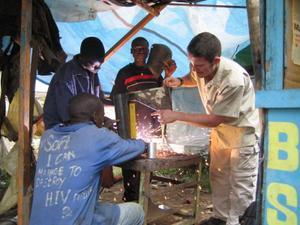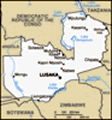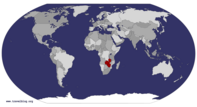Advertisement
Published: February 20th 2005

 Zambia 3
Zambia 3
Good thing everybody has the proper eye protectionMy journey begun not in Zambia, but in Canada for three intense weeks of preparation. One week in Vancouver for the Engineers Without Borders conference and two weeks in Toronto. During this time, I went through a mind expanding overseas development training course. Now, although I had already had taken courses in development studies in University, personally studied and taught development at the EWB Calgary chapter for 3 years, and went through a one week EWB course before my placement in India, this training took my level of understanding of development to a whole new level. I trained with 8 other phenomenally talented and passionate volunteers; 2 going to Haiti, 2 to Ghana, 1 to Cameroon, 1 to Lesotho, 1 undetermined, and myself to Zambia. We were equipped with an arsenal of tools and knowledge that we will use to help better understand and play our role in the extremely complex challenge of fighting world poverty.
So, after a 6-hour flight to England, a lightning quick 10-hour revisit of London and then an 8-hour flight to Lusaka, I arrived in Zambia. My first impressions of Lusaka was that it felt more like a large town then a capital city of

 Zambia 4
Zambia 4
David learning how to weld2 million people. I think that my experience in India skews my perceptions though. I’m used to having 500 people mauling me at the bus station, grabbing my arms and asking me if I want a cab, a fake Rolex or a new friend. And to get them to leave me alone, I need to say no to each individual person 3 times before I can escape. Instead, here there are only maybe 30 guys just casually lying around by the gate of the station asking if I could use a cab. And all it takes to halt their questioning and cause them to go back to their typical relaxed state is a short shake of the upward facing palm, indicating that I have no money. The people here in Lusaka are much more polite and relaxed about life. As a matter of fact, the entire Zambian culture here in the capital city is quite subdued and easy going. I figure it must have something to do with the European colonial history tied with a large amount of time under a socialist government rule. I have also been extremely impressed with how intelligent most Zambians I’ve spoken with are. Especially when it comes to international economics and politics. Even people who only have up to a grade 8 education know about the newest International Monetary Fund and World Bank government and economic structural adjustment policies forcing them to privatize every industry in their country. But I guess it makes sense when these large foreign institutes have had so much influence in shaping (read by most Zambians as: destroying) the state of the country. However, this is a contentious topic that I will leave for now, knowing that I’ll discuss it in more detail at a later date because it pretty much impacts most things that go on here.
The main food staple here is a ground up maize (corn) based carbohydrate called Nsima (pronounced she-ma). Nsima has about the same texture and consistency as mashed potatoes and is served with all sorts of different dips or “relishes”. These relishes usually consist of a local vegetables such as pumpkin leaves, onions, tomatoes, spinach, eggplant and rape (canola) and then maybe some meat such as beef, chicken or fish, depending on whether they can afford it or not. For most Zambians, nsima is eaten for all 3 meals during the day. Although people sometimes eat bread and rice here, most Zambians could eat an entire meal, but if they haven’t eaten any nsima with their meal, then they will say that they have not eaten. I have already made some Zambian friends who have mentored me in the “art” of making nsima. It is quite the work out and despite the typical Zambian persons reaction of rolling on the ground laughing watching me, I think I’m doing better. At least now I’m keeping at least a quarter of the nsima still in the pot, the rest ending up in random spots around the kitchen including the kitchen top, the roof and all over my shirt.
Temporary accommodation within Lusaka is actually quite expensive, so currently I’m staying at the cheapest place possible within the main city limits. It is a hostel type place that is filled with all sorts of fascinating people. Other NGO workers of whom most are working in some form or another on the HIV/AIDS problem, local Zambians in transition between finding a permanent residence, scraggly foreign ex-pats who have been bumming around Zambia for years and years, tourists usually just stopping in before they head off on their safaris and just a whole bunch of random people. You get quite a range of opinions and attitudes here and it has made for a lot of interesting debates and conversation topics ranging from hearing about how someone almost got eaten by a hippopotamus to the benefits and drawbacks of polygamy (I think the benefits side won!). I’ve made some great friends here who have taught me a lot about development here in Zambia and I’ve really glad that I’ve had the chance to transition to Zambia in this way. But I know that staying here too long will trap me in only seeing Zambian life from an outsider’s point of view. I’m glad that this week I’ll be moving to the smaller town of Mazabuka to start my field training and live with a local IDE staff and start my slow integration into local Zambian culture.
In Zambia there are 8 official languages, English being the most widely spoken throughout the country and the other 7 being used locally based on the tribal ethnicity of the area. I’m currently learning some Nyanja because it is widely spoken in Lusaka, but I will have to shift my focus to the language of Tonga because it is what most people in southern Zambia as well as the farmers that I will be working with speak. It is amazing how much warmer people open up to you once you speak just a couple of phrases to them in their native language. Even if I completely screw up their pronunciation and order.
My first week was a whirlwind of emotion and learning and probably only a small taste of things to come. The director of my NGO, Peter Manda, is a very strategic and intelligent man and I am very excited to be working under his leadership. I have spent most of my time learning about the Lusaka operations of the project and gaining a better understanding of how things work internally. I spent two days in the shanty-town outskirts of Lusaka learning from the local steel and plastic manufactures who make the pieces for the treadle pumps. Being in the center of Lusaka, you don’t really get any feel whatsoever about the poverty situation in Zambia. The infrastructure, although not great by any means, is quite adequate, the city is decently clean and most of the people you see are pretty well off.
However, once I headed off into the slum areas, everything changed. I was shocked initially at what I saw.
I saw a huge scattering of unfinished stone compounds filled by overly sized families and women who didn’t understand how to family plan. Maybe an initial thought that popped into my head was that maybe with a community education center these women could get some help in understanding the problems caused by having so many children. I saw random children working in small shops making clothes and wandering around selling peanuts, popcorn and t-shirts. I thought about what a shame it was that child labour existed and that maybe an idea I had was that with proper laws and schools these children wouldn’t have to be subjected to such a life. I saw groups of men just laying around doing nothing but drinking and stumbling all over each other. I thought that maybe an initial idea that I had was that closing all the bars and teaching these men how to properly spend their money would help set them on a better path. I had this overall general feeling of helplessness and I felt a little sick.
Seeing World Vision commercial type situations like this strikes that feeling of horror in you because it seems so helpless and desolate. It makes you feel guilty about not doing anything about the problem and causes you to instantly try and do something to fix it. Whether that thing being blindly donating money, shipping food and clothing over, or immediately jumping on a plane to share your expertise and try to do something about the problem. The feeling becomes more about just doing something because it seems better then doing nothing. However, just doing something isn’t always doing the right thing. As a matter of fact, most of the time it means doing the wrong thing. I hear time and time again from people here is that one of the biggest problems in Zambia right now is the work being done by people who are here trying to help. Again though, this is another contentious issue that affects a lot of things here but I’ll leave for a later email.
But the feeling of doing something still floods throughout my body. And right away I start thinking that maybe I know some ways to solve some of these problems. I think that maybe I know what the right approach is. I feel I maybe know more about this because of years of learning about what people have done in the past that have succeeded and failed. I feel I maybe know a little more about this because I have blindly sponsored a child without understanding how that money is actually helping them only to learn that it isn’t being spent on what I felt was appropriate, I feel I maybe know a little more about this because on my first overseas placement in India I probably jumped to solutions to the problems too fast. I only had a limited time there and tried to offer my outside opinions without completely considering the context of the situation or the long-term effects of my impact.
But once I start thinking those things, I know that I am doing so inappropriately. I know that I must check my initial opinions and remember that I am only viewing the situation as seen through the lenses of someone coming from a western country. I know that behind the initial TV commercial scene is a group of people who have developed their own intelligent coping mechanisms for the situations they are in.
I know that within those oversized families are ridiculously hard working women who wake up at sunrise and spend all day selling produce at the market only to come home to a full slate of household chores and child care activities that allow them only to sleep 3-4 hours a night. I know that these women need large families in order to help with all the work that needs to be done and to help support them when they get old.
I know that those children working in the shops and selling goods on the streets are only doing it because without working they don’t eat. I know that a large number of these children are probably AIDS orphans meaning that both of their parents have died of AIDS. I know that they have no one else to provide them with food and having a job actually helps keep them alive and without those jobs they would starve.
I know that the drunken men only do so because they are coping with the issue of not being able to provide for their families and children due to being unemployed. I know that alcohol is the only way to compensate for the toll their self-esteem takes when the only people they see working in their country are White and Asian people and wonder about what about having black skin means they can’t get a job.
I know that this beast who we term poverty is to blame for a large number of these problems, but the only common solution the world has for taming this beast is by calling it complex. I know that all I can know from spending just two days in this area actually talking to these people and trying to understand the deeper issues surrounding their situations is that the initial solutions that first popped into my mind were shallow and presumptuous. I know, that the only thing I should do now is to ask lots of questions and offer no solutions.
I know that the only thing I think I should know now, is that I don’t know anything…………but that I’m going to learn.
Advertisement
Tot: 0.172s; Tpl: 0.013s; cc: 8; qc: 63; dbt: 0.0924s; 1; m:domysql w:travelblog (10.17.0.13); sld: 1;
; mem: 1.2mb










anonymous
non-member comment
Please continue posting
Thank you so much for recording your initial thoughts and impressions about Zambia. I, and 5 others from our church, will be traveling to Lusaka in August of this year, and your posting is helping us to get ready for our experience. I hope that you will continue to tell us about your daily activities, and about what you learn about the Zambian culture. Any "survival tips" you can add would be much appreciated. - Laurie Hurd